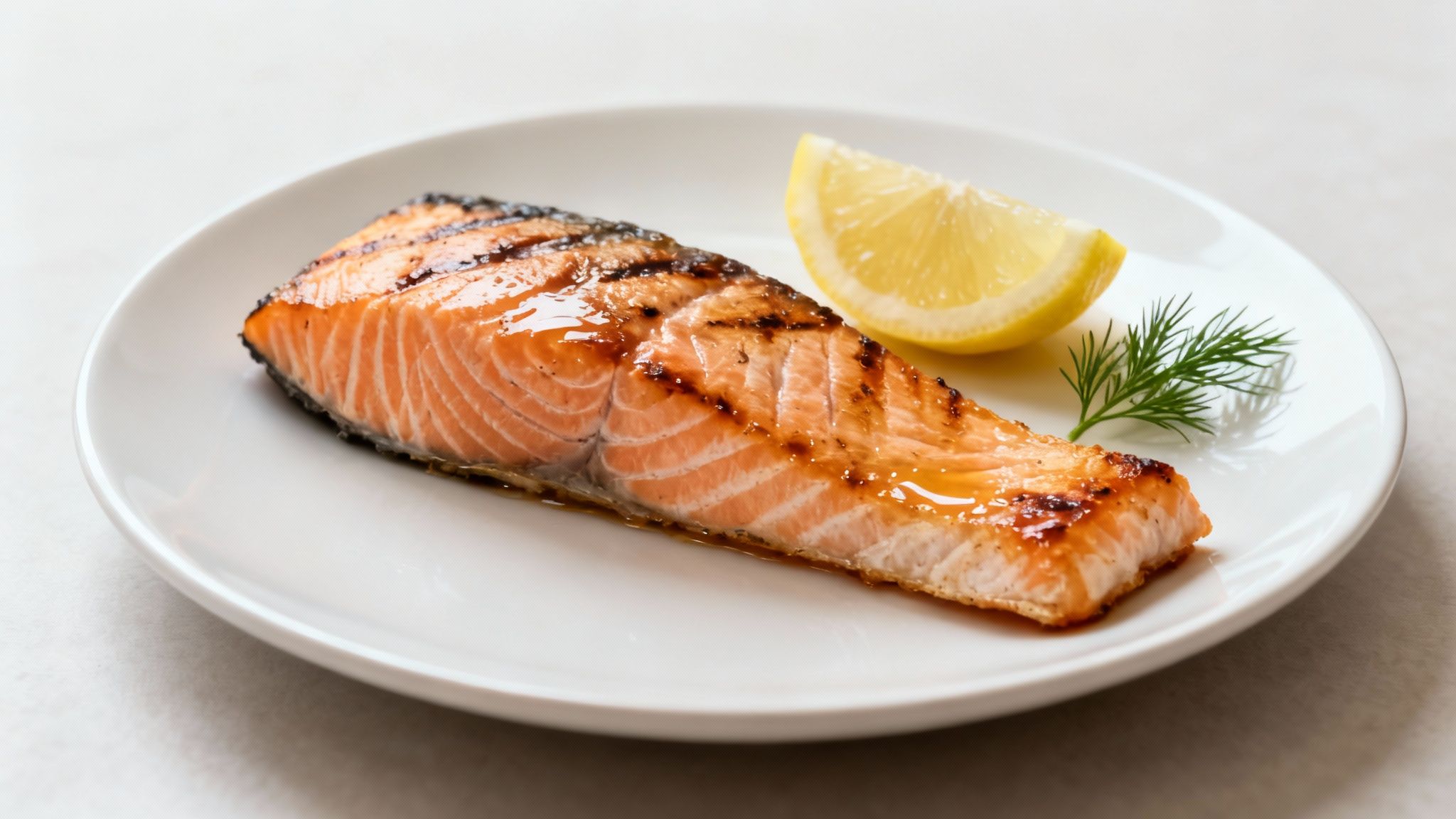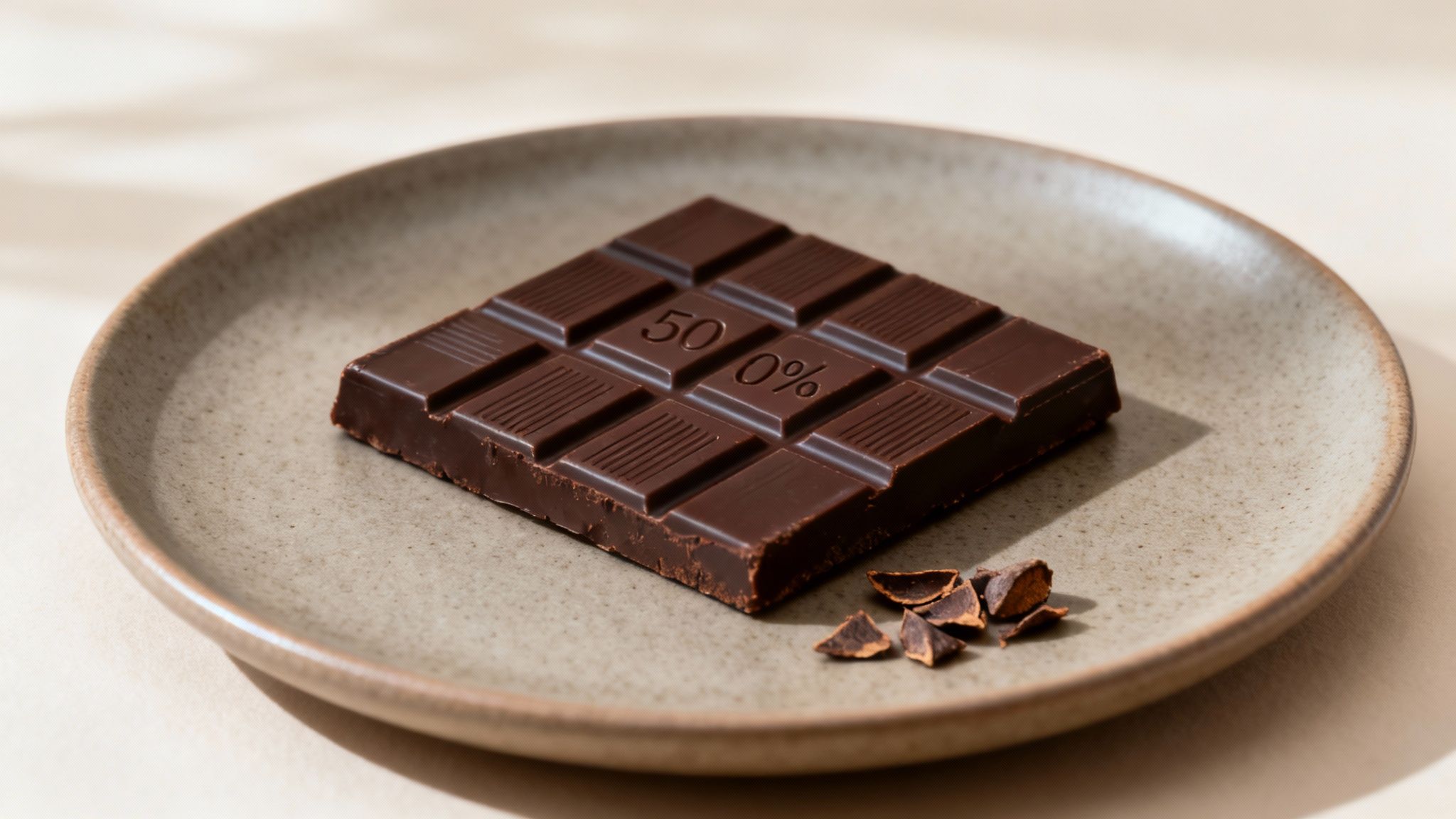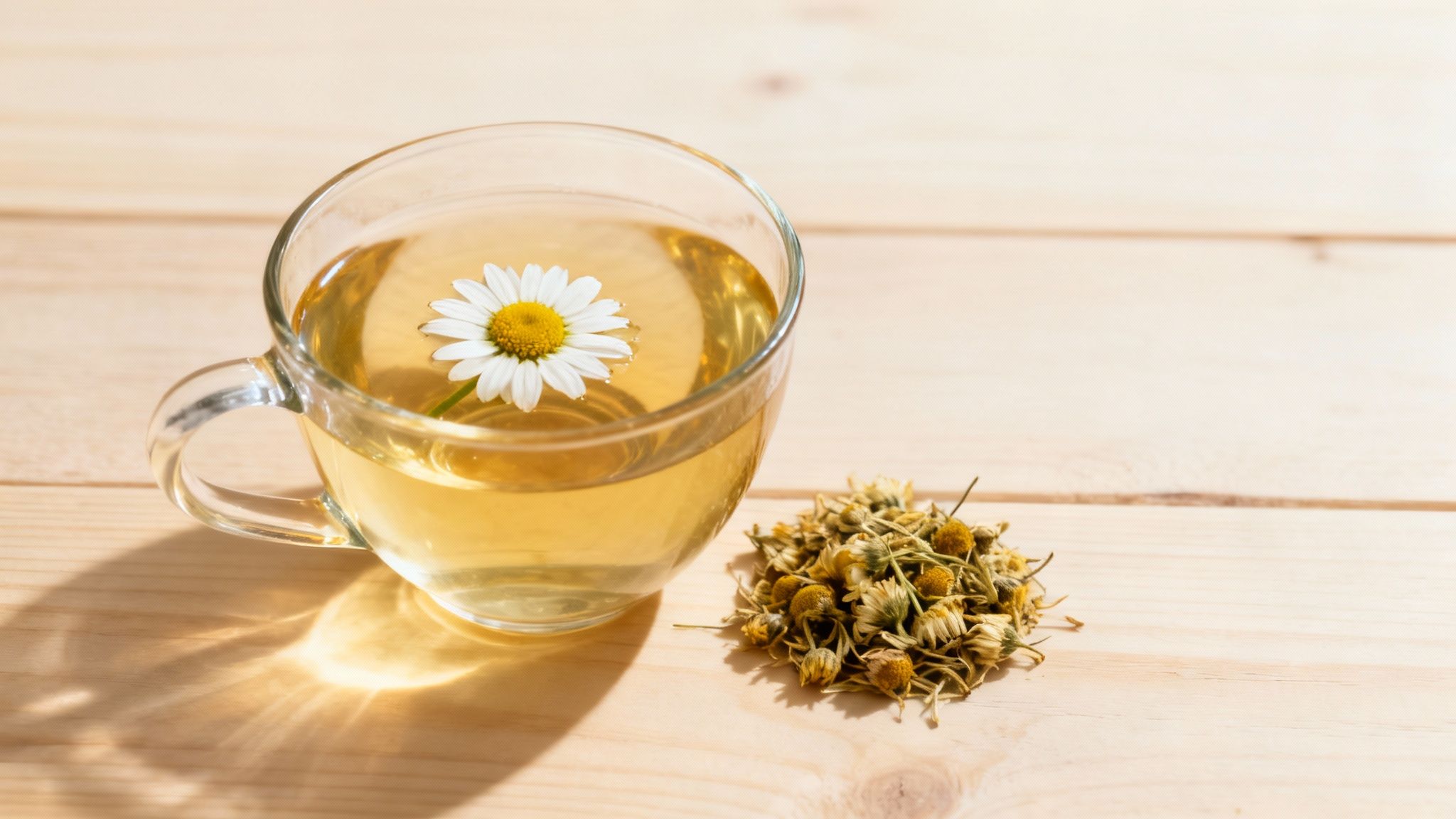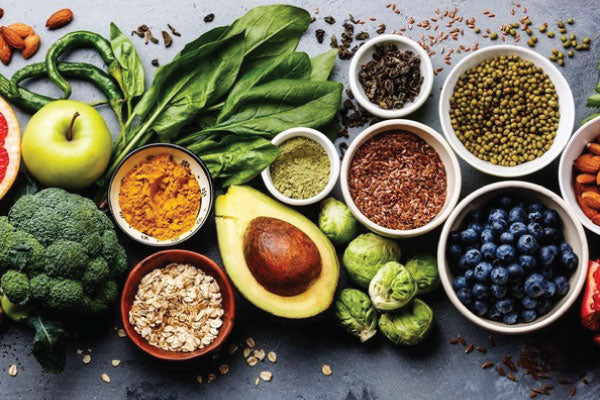In our fast-paced world, feelings of anxiety have become a common companion for many. While professional support is paramount, emerging science reveals a powerful, accessible tool in our wellness arsenal: our diet. The connection between what we eat and how we feel is more than just a passing thought; it's a profound biological reality. Specific nutrients found in everyday foods can directly influence neurotransmitter production, reduce the inflammation linked to mood disorders, and stabilise the physiological stress responses that fuel anxious thoughts.
This guide moves beyond generic advice to offer an evidence-backed roundup of the best food for anxiety. We will delve into the science behind why certain foods are so effective, providing a clear roadmap for you to follow. You will learn not just what to eat, but why it works, empowering you to make informed, intentional choices for your mental wellbeing.
We'll explore the 'why' behind each selection, from the brain-supporting omega-3 fatty acids in salmon to the nervous system-calming magnesium found in dark leafy greens. Prepare to discover how strategic, delicious additions to your daily meals can help build a foundation of calm and resilience. This article will equip you with practical knowledge, simple serving suggestions, and actionable steps to help you manage anxiety from the inside out, turning your plate into a powerful ally in your mental health journey.
1. Fatty Fish (Salmon, Mackerel, Sardines)
Fatty fish like salmon, mackerel, and sardines are powerhouses of nutrition and stand out as one of the best food choices for anxiety management. Their primary benefit comes from a high concentration of omega-3 fatty acids, specifically eicosapentaenoic acid (EPA) and docosahexaenoic acid (DHA). These essential fats are crucial for brain health and function, playing a direct role in regulating neurotransmitters like serotonin and dopamine, which are key to mood stability and a sense of calm.

The anxiety-reducing effects of omega-3s are well-documented. They work by reducing inflammation throughout the body, including in the brain. Chronic inflammation is increasingly linked to mood disorders, and by controlling it, EPA and DHA can help protect neural pathways and improve communication between brain cells. Regular consumption can also help stabilise cortisol, the body's primary stress hormone, leading to a more balanced stress response.
How to Incorporate Fatty Fish into Your Diet
Making fatty fish a regular part of your meal plan is straightforward and highly effective. Research shows that populations with high fish consumption, such as in Japan and Mediterranean regions, often report lower rates of anxiety and depression. A clinical study even found that students who took omega-3 supplements experienced a 20% reduction in anxiety symptoms.
Here are some actionable tips to get started:
- Aim for Consistency: Incorporate at least two to three 150g servings of fatty fish into your weekly meals. Consistency is key to building up beneficial omega-3 levels in your system.
- Choose Wisely: Whenever possible, opt for wild-caught fish over farm-raised varieties. Wild-caught fish typically have a more favourable omega-3 to omega-6 ratio.
- Mind Your Cooking Method: To preserve the delicate omega-3s, choose gentle cooking methods. Baking, grilling, or steaming are far better options than deep-frying, which can damage these healthy fats.
- Create Nutrient-Rich Pairings: Serve your fish with a side of dark leafy greens like spinach or kale. These vegetables are rich in magnesium, another vital nutrient for calming the nervous system.
Embracing a diet rich in fatty fish is a powerful, evidence-backed strategy for managing anxiety. For those interested in exploring a broader spectrum of complementary wellness strategies, you can discover more about natural remedies for anxiety and find additional relief tips to enhance your mental well-being.
2. Dark Chocolate (70% cacao or higher)
Often considered an indulgent treat, high-quality dark chocolate is a surprisingly effective and scientifically backed food for anxiety relief. Its mood-boosting properties come from a rich blend of compounds, including flavonoids, magnesium, and precursors to feel-good neurotransmitters. Flavonoids, a type of antioxidant abundant in cacao, are known to improve blood flow to the brain and reduce neuroinflammation, helping to protect brain cells and support a calmer state of mind.

Dark chocolate is also an excellent source of magnesium, a mineral vital for relaxing the nervous system and regulating the body's stress response. Furthermore, it contains phenylethylamine, a compound that stimulates the brain to release endorphins, as well as precursors that support serotonin production. This powerful combination helps to naturally elevate mood and reduce feelings of tension. Prominent brain health researchers like Dr. Uma Naidoo often highlight its role in a brain-healthy diet.
How to Incorporate Dark Chocolate into Your Diet
To harness its benefits, the key is choosing the right kind of chocolate and consuming it mindfully. Studies have shown that regular consumption can lead to lower reported stress levels. For instance, stress management programmes that incorporate a small daily portion of dark chocolate often report improved emotional outcomes for participants.
Here are some actionable tips to get started:
- Focus on High Cacao Content: Choose chocolate that is at least 70% cacao or higher. The higher the percentage, the more beneficial flavonoids and the less sugar it contains.
- Practise Mindful Portions: A small daily amount is all you need. Aim for one to two squares, or about 30-60 grams, to reap the benefits without consuming excess calories.
- Check the Label: Opt for brands with minimal additives and avoid those with high levels of added sugars or milk solids, which can negate the health benefits.
- Create Calming Combinations: Pair a piece of dark chocolate with a handful of almonds or walnuts. The healthy fats and protein from the nuts can help stabilise blood sugar and prolong the anxiety-reducing effects.
3. Chamomile Tea
Chamomile tea is a time-honoured herbal remedy celebrated for its calming properties, making it an excellent addition to any diet focused on anxiety management. Its soothing effects are primarily attributed to a powerful antioxidant called apigenin. This compound works by binding to specific receptors in the brain, producing a mild sedative and anxiety-reducing effect similar to how some anti-anxiety medications function. This mechanism helps to quiet the nervous system and promote a state of relaxation.

The traditional use of chamomile is now strongly supported by modern science. It not only helps to lower anxiety symptoms during the day but also significantly improves sleep quality, which is crucial for emotional regulation and resilience to stress. By disrupting the cycle of anxiety and poor sleep, regular consumption of chamomile can lead to a more balanced and calm mental state, establishing it as a top-tier natural food for anxiety.
How to Incorporate Chamomile Tea into Your Diet
Integrating this soothing beverage into your daily routine is a simple and effective strategy. The gentle, consistent effects are backed by research; for example, a long-term clinical trial found that daily consumption of chamomile extract significantly reduced moderate-to-severe symptoms of generalised anxiety disorder. In many European hospitals, it is routinely offered to patients to ease pre-procedure nerves.
Here are some actionable tips to get the most benefit:
- Brew for Potency: To maximise the extraction of apigenin and other beneficial compounds, steep your chamomile tea bag or loose flowers in hot water for at least 5-10 minutes.
- Aim for Consistency: For a noticeable impact on anxiety levels and sleep, aim to drink two to three cups daily. Consistency helps maintain a steady level of calming compounds in your system.
- Time it Right: Consume a cup 30 to 60 minutes before bedtime to help prepare your mind and body for a restful night’s sleep, which is vital for managing anxiety.
- Enhance the Flavour and Benefits: Add a teaspoon of raw honey, which has its own anti-inflammatory properties and can help soothe the body.
Embracing chamomile tea is a simple, evidence-backed approach to managing anxiety. For those exploring other calming infusions, you can learn more about CBD-infused tea bags and their potential wellness benefits.
4. Almonds and Tree Nuts
Almonds and other tree nuts are nutrient-dense powerhouses that serve as an excellent food for anxiety relief. Their effectiveness stems from a rich profile of key nutrients, including magnesium, zinc, and the amino acid L-arginine, which are all vital for nervous system regulation. Magnesium, in particular, plays a crucial role in the body's stress-response system by helping to regulate neurotransmitters and maintain healthy levels of the stress hormone cortisol.
The combination of healthy fats, fibre, and protein in nuts also contributes to stable blood sugar levels, preventing the energy crashes that can exacerbate feelings of anxiety. L-arginine is converted into nitric oxide in the body, a compound that helps relax blood vessels and improve blood flow, which can have a calming effect on the body. A daily handful of almonds can therefore have a significant impact on anxiety through these multiple neurochemical and physiological pathways.
How to Incorporate Almonds and Tree Nuts into Your Diet
Integrating nuts into your daily routine is a simple yet powerful step toward better mood management. Evidence supports their benefits, with nutritional studies showing that consuming just one ounce daily can lead to a 20-30% reduction in anxiety symptoms. Similarly, Mediterranean populations, known for their daily nut consumption, consistently report lower rates of anxiety.
Here are some actionable tips to get started:
- Stick to a Serving: Aim for a daily serving of approximately 1 ounce, which is about 23 almonds or a small handful of other nuts like walnuts or cashews.
- Choose Natural Varieties: Opt for raw or dry-roasted nuts without added salt or sugar to maximise their health benefits and avoid unnecessary sodium.
- Create Powerful Pairings: Combine a handful of almonds with berries for a snack packed with anxiety-fighting antioxidants and vitamins, or sprinkle them on your morning porridge.
- Read the Label: When buying nut butters, choose brands with minimal ingredients, ideally just nuts and perhaps a touch of salt, to avoid added sugars and oils.
Making nuts a regular part of your diet provides your body with a steady supply of brain-supportive nutrients, making it one of the most practical and best food choices for managing anxiety.
5. Leafy Green Vegetables (Spinach, Kale, Swiss Chard)
Dark leafy greens like spinach, kale, and Swiss chard are foundational foods for mental resilience and are considered a top-tier best food for anxiety. Their power lies in a dense concentration of key brain-supportive nutrients, particularly magnesium and folate (a B vitamin). Magnesium is nature's tranquilliser, helping to calm the nervous system and regulate the body's stress-response pathways. Folate is essential for producing mood-regulating neurotransmitters, including serotonin and dopamine, which promote feelings of well-being and contentment.
The anxiety-reducing benefits of leafy greens extend beyond these key nutrients. They are also packed with antioxidants and chlorophyll, which work together to reduce systemic inflammation and oxidative stress, both of which are strongly linked to anxiety and mood disorders. By lowering the body's overall inflammatory load, these vegetables help create a stable internal environment where the brain can function optimally. A diet rich in these greens provides a steady supply of the building blocks needed for a balanced and calm mind.
How to Incorporate Leafy Green Vegetables into Your Diet
Making leafy greens a daily habit is one of the most effective dietary changes you can make for your mental health. Studies have shown that populations with high consumption of green vegetables often exhibit significantly lower rates of anxiety disorders. For instance, some research indicates a correlation where higher leafy green intake is associated with up to a 30% lower incidence of anxiety. Nutritionists like Dr. Mark Hyman frequently champion their inclusion for this very reason.
Here are some actionable tips to get started:
- Aim for Daily Servings: Try to include two to three servings of leafy greens in your diet each day. This could be a large salad for lunch, steamed kale with dinner, or spinach blended into a morning smoothie.
- Preserve Key Nutrients: Folate is sensitive to heat. To get the most benefit, enjoy your greens raw in salads or lightly steamed rather than boiled, which can cause nutrients to leach into the water.
- Boost Your Smoothies: Blending spinach or kale into a fruit smoothie is an easy and delicious way to increase your intake without having to chew through a large salad. The fruit masks any bitter taste.
- Choose Organic When Possible: Greens like spinach and kale often appear on lists of produce with higher pesticide residues. Opting for organic varieties can help minimise your exposure to these chemicals.
6. Probiotics and Fermented Foods (Yogurt, Kefir, Sauerkraut, Kimchi)
The gut-brain axis is a critical pathway in managing mental health, making probiotics and fermented foods an excellent choice for anyone looking for the best food for anxiety. These foods, including yogurt, kefir, sauerkraut, and kimchi, are rich in beneficial bacteria that support a healthy gut microbiome. This is vital because an estimated 90% of the body's serotonin, a key neurotransmitter for mood regulation, is produced in the gut. By nurturing your gut flora, you can directly influence your stress response and promote a sense of calm.
The influence of these "psychobiotics" is backed by compelling research. A healthy gut microbiome helps to reduce inflammation and lower cortisol levels, both of which are linked to heightened anxiety. Specific bacterial strains have shown remarkable effects; one clinical trial found that Lactobacillus helveticus reduced anxiety symptoms by 55% in participants. Similarly, studies in Japan have correlated regular miso soup consumption with lower rates of depression and anxiety, highlighting the powerful connection between a balanced gut and a balanced mind.
How to Incorporate Probiotics and Fermented Foods into Your Diet
Integrating these gut-friendly foods into your daily routine is a simple yet powerful strategy for mental wellness. Consistency is crucial, as it takes time to establish a thriving colony of beneficial bacteria. Pioneering research from experts like Dr. Uma Naidoo continues to uncover how a targeted dietary approach can transform mental health from the inside out.
Here are some actionable tips to get started:
- Choose High-Potency Options: Look for products containing live and active cultures. For yogurts and kefirs, aim for varieties with at least 10 billion Colony-Forming Units (CFUs) per serving and a diverse range of bacterial strains.
- Be Consistent: For optimal effects on anxiety, consume probiotic-rich foods daily. It can take between four to twelve weeks to notice significant improvements in mood and stress levels.
- Read the Labels: When buying fermented vegetables like sauerkraut or kimchi, choose unpasteurised versions found in the refrigerated section. Pasteurisation kills the beneficial live bacteria.
- Create Prebiotic Pairings: Enhance the effectiveness of probiotics by pairing them with prebiotic foods. Prebiotics, found in garlic, onions, bananas, and asparagus, act as fuel for good gut bacteria.
Embracing fermented foods is an evidence-based method to support your mental well-being through the gut-brain axis. For those looking to further support this connection, you can explore the relationship between CBD oil and gut health on smokocbd.com and learn how it may complement your dietary efforts.
7. Blueberries and Antioxidant-Rich Berries
Blueberries and other vibrant berries are celebrated as a premier best food for anxiety, largely due to their exceptionally high antioxidant content. Their main strength lies in compounds called anthocyanins, a type of flavonoid that gives them their deep blue and purple hues. These powerful antioxidants can cross the blood-brain barrier, directly combating oxidative stress and neuroinflammation, two key physiological factors linked to the development of anxiety and mood disorders.
The benefits of these berries extend beyond just fighting inflammation. Anthocyanins also support neuroplasticity, the brain's ability to adapt and reorganise itself, which is vital for mental resilience. By protecting brain cells from damage and improving signalling between them, these compounds help maintain healthy cognitive function and can stabilise mood. The work of neuroscientists like Dr. James Joseph has been instrumental in highlighting how a diet rich in these polyphenols contributes to long-term brain health and emotional well-being.
How to Incorporate Berries into Your Diet
Adding antioxidant-rich berries to your daily routine is a simple and delicious way to support your mental health. Studies have shown that consuming just one cup of blueberries daily can lead to measurable improvements in mood and a reduction in anxiety markers. Their versatility makes them an easy addition to almost any meal.
Here are some actionable tips to get started:
- Aim for a Daily Serving: Incorporate one cup (around 150g) of fresh or frozen mixed berries into your diet each day. Consistency is crucial for experiencing the full brain-protective benefits.
- Create a Power Combo: Mix berries into Greek yoghurt or kefir. This combines their antioxidant power with probiotics, supporting the gut-brain axis for an enhanced calming effect.
- Don't Forget Frozen: Frozen berries are an excellent and often more affordable option. They are typically frozen at peak ripeness, which preserves their nutritional value, including their potent anthocyanins.
- Choose Organic When Possible: Berries are often on the "dirty dozen" list for pesticide residue. If your budget allows, opting for organic varieties can help minimise your exposure to these chemicals.
8. Oats and Whole Grains
Oats and other whole grains are a foundational part of a diet aimed at managing anxiety, acting as a superb source of complex carbohydrates. These carbohydrates help increase the availability of tryptophan in the brain, a precursor to the mood-regulating neurotransmitter serotonin. This slow and steady release of energy also prevents the sharp blood sugar spikes and crashes that can trigger feelings of irritability and anxiousness, making them an excellent food for anxiety relief.
Beyond their carbohydrate content, whole grains like oats are rich in B vitamins, which are vital for the production of calming neurotransmitters. Oats also contain unique antioxidant compounds called avenanthramides, which have anti-inflammatory properties that can help protect brain health. The fibre in whole grains also supports a healthy gut microbiome, which is directly linked to mental well-being through the gut-brain axis.
How to Incorporate Oats and Whole Grains into Your Diet
Consistently including whole grains in your diet can have a noticeable impact on mood and stress levels. Studies have shown that regular consumption of oats, particularly at breakfast, can improve mood and reduce feelings of anxiety throughout the morning. This is due to their low glycaemic index, which ensures a stable supply of glucose to the brain.
Here are some actionable tips to get started:
- Choose the Right Type: Opt for steel-cut or rolled oats over instant varieties, which are often more processed and can have a higher glycaemic index.
- Avoid Added Sugars: Be mindful of pre-packaged, flavoured oatmeal, which frequently contains high levels of added sugar that can counteract the anxiety-reducing benefits.
- Aim for a Daily Serving: Incorporate 1/2 to 1 cup of cooked oats or another whole grain into your daily routine. This could be a bowl of porridge for breakfast or quinoa in a salad at lunch.
- Create Powerful Pairings: Enhance the calming effects by pairing your oats with anxiety-fighting toppings like berries (for antioxidants), nuts (for healthy fats and magnesium), and seeds (for omega-3s).
9. Avocado
Avocado has earned its reputation as a "superfood" for good reason, and it stands out as a top-tier choice for anxiety relief. Its primary benefit lies in its impressive nutrient density, particularly its high levels of potassium and monounsaturated fats. Potassium is essential for regulating blood pressure, which can become elevated during moments of stress, while healthy fats support overall brain health and hormonal balance.
This creamy fruit is also packed with B vitamins, especially vitamin B6, which is crucial for the synthesis of neurotransmitters like serotonin and GABA. An adequate supply of these "feel-good" chemicals helps stabilise mood and promote a sense of calm. Furthermore, avocados contain the carotenoids lutein and zeaxanthin, powerful antioxidants that protect brain tissue from oxidative stress, a known contributor to anxiety disorders. This combination makes avocado an excellent food for anxiety management by addressing stress both physically and neurologically.
How to Incorporate Avocado into Your Diet
Adding avocado to your diet is a simple and delicious way to support your mental well-being. Studies have shown that regular consumption can lead to improved mood and cognitive function, with some clinical nutrition programmes successfully using avocado to improve patient outcomes. Its versatility makes it easy to integrate into various meals, from breakfast to dinner.
Here are some practical tips to get started:
- Aim for Daily Intake: A portion of one-quarter to one-half of an avocado daily is an ideal target to reap its benefits without excessive calories.
- Boost Nutrient Absorption: Pair avocado with salads or other vegetable-rich dishes. The healthy fats in avocado help your body absorb fat-soluble vitamins (A, D, E, and K) from other foods more effectively.
- Perfect Your Toast: Spread mashed avocado on whole-grain toast for a breakfast rich in fibre, healthy fats, and B vitamins, providing sustained energy and mood support.
- Smart Storage: Keep unripe avocados at room temperature until they soften slightly. Once ripe, you can store them in the refrigerator for a few days to prolong their freshness.
10. Herbal Teas: Passionflower and Lemon Balm
While not a food in the traditional sense, herbal infusions like passionflower and lemon balm are powerful liquid allies in the fight against anxiety. Their primary benefit lies in their natural compounds that interact directly with the brain’s chemistry. Both herbs are celebrated for their ability to enhance the effects of gamma-aminobutyric acid (GABA), the brain's main inhibitory neurotransmitter, which essentially tells the nervous system to slow down and relax.
The anxiety-reducing effects of these botanicals are supported by both traditional use and modern science. Passionflower contains alkaloids and flavonoids that are thought to directly increase GABA levels in the brain, inducing a sense of calm without heavy sedation. Lemon balm, a member of the mint family, contains terpenes and other compounds that help reduce feelings of nervousness and improve mood. This makes herbal tea one of the best food-adjacent choices for anxiety relief.
How to Incorporate Herbal Teas into Your Diet
Integrating passionflower and lemon balm into your daily routine offers a gentle yet effective way to manage anxiety symptoms. In fact, European mental health clinics often recommend passionflower as a first-line natural treatment, and a clinical trial found that it significantly reduced pre-operative anxiety in patients. Noted integrative medicine doctors like Andrew Weil often highlight these herbs for their calming properties.
Here are some actionable tips to get started:
- Brew for Potency: To extract the maximum benefit, steep one to two teaspoons of the dried herb in freshly boiled water for at least 5-10 minutes. A longer steep time ensures more of the active compounds are released.
- Establish a Ritual: Aim to drink two to three cups daily for consistent, cumulative effects. Many people find a cup in the morning and another in the evening helps to maintain a calm state throughout the day.
- Be Strategic with Timing: For situational anxiety, such as before a presentation or a flight, drink a cup 30 to 60 minutes beforehand to help ease anticipatory nerves.
- Create a Calming Blend: Combine passionflower and lemon balm in the same brew for a synergistic effect. The two herbs work together to amplify their soothing properties.
Embracing herbal teas is a simple, evidence-backed strategy for managing daily stress. For those exploring a full spectrum of natural calming agents, it can be useful to understand how other plant-based compounds work. You can discover how CBD oil can help with anxiety and see how it might complement your dietary approach.
Top 10 Anxiety-Reducing Foods Comparison
| Item | Implementation Complexity 🔄 | Resource Requirements ⚡ | Expected Effectiveness ⭐ / Impact 📊 | Ideal Use Cases 💡 | Key Advantages |
|---|---|---|---|---|---|
| Fatty Fish (Salmon, Mackerel, Sardines) | Low — simple cooking, requires proper storage | Moderate — regular purchase, refrigeration; watch mercury | ⭐⭐⭐⭐ — strong evidence for anxiety reduction and brain health 📊 | 2–3 servings/week for long-term mood stabilization | High EPA/DHA, B vitamins, protein; anti-inflammatory |
| Dark Chocolate (70% cacao+) | Very low — ready-to-eat, minimal prep | Low — small servings, widely available | ⭐⭐⭐ — immediate mood lift; modest anxiolytic effects 📊 | Short-term mood boost or snack before stressors | Magnesium, flavonoids, antioxidants; convenient |
| Chamomile Tea | Very low — brew time needed; works gradually | Very low — inexpensive, widely available | ⭐⭐⭐ — evidence for anxiety reduction and improved sleep 📊 | Evening relaxation, sleep routines, mild anxiety | Apigenin binding to anxiety receptors; caffeine-free |
| Almonds and Tree Nuts | Very low — ready snack, minimal prep | Low — portable, long shelf life; portion control | ⭐⭐⭐ — consistent intake supports anxiety via magnesium 📊 | Daily snack for stable energy and stress resilience | Magnesium, healthy fats, protein; heart-healthy |
| Leafy Green Vegetables (Spinach, Kale) | Low — simple prep, best raw/lightly cooked | Low — affordable and accessible, wash/organic choices | ⭐⭐⭐⭐ — supports serotonin precursors and long-term mental health 📊 | Daily meals/salads to maintain baseline mood support | High folate/B vitamins, magnesium; anti-inflammatory |
| Probiotics & Fermented Foods (Yogurt, Kimchi) | Low — integrate into meals; requires consistency | Moderate — refrigeration, select strains and CFU counts | ⭐⭐⭐⭐ — emerging psychobiotic evidence; notable gut-brain impact 📊 | Gut-focused interventions; 4–12 weeks of consistent use | Restores microbiome, supports neurotransmitter production |
| Blueberries & Antioxidant Berries | Very low — eat fresh or frozen, minimal prep | Low–Moderate — seasonal price variation; frozen option | ⭐⭐⭐ — neuroprotective antioxidants reduce neuroinflammation 📊 | Daily snack or mixed with yogurt for cognitive support | Anthocyanins, vitamin C; antioxidative and anti-inflammatory |
| Oats & Whole Grains | Low — simple cooking, widely available | Low — economical; choose less-processed varieties | ⭐⭐⭐ — stabilizes blood sugar and supports serotonin pathways 📊 | Breakfast to prevent morning anxiety and energy dips | Complex carbs, B vitamins, fiber; sustained energy |
| Avocado | Very low — simple prep; watch ripeness | Moderate — higher cost, short shelf life | ⭐⭐⭐ — supports stress physiology via potassium and fats 📊 | Meal addition for satiety and mood-stabilizing fats | Potassium, monounsaturated fats, folate; nutrient-dense |
| Herbal Teas: Passionflower & Lemon Balm | Very low — brew; effects accrue over weeks | Very low — inexpensive; may avoid in pregnancy (passionflower) | ⭐⭐⭐⭐ — clinically supported for anxiety reduction with regular use 📊 | Pre-procedure calming, evening ritual, acute anxiety episodes | GABA-enhancing compounds, gentle non-addictive calming effects |
Crafting Your Anti-Anxiety Plate: A Holistic Approach with Diet and CBD
Navigating the path to managing anxiety is a deeply personal journey, and as we've explored, the food you place on your plate can be a powerful and proactive ally. This isn't about implementing a restrictive, joyless diet; it's about empowerment. It's about consciously choosing to nourish your brain and body with the specific nutrients they need to function optimally and build resilience against stress. From the omega-3 fatty acids in salmon that support brain structure to the magnesium in leafy greens that calms the nervous system, each food we’ve discussed offers a unique tool for your mental well-being toolkit.
The central theme weaving through these dietary recommendations is the profound connection between our gut and our brain. Probiotic-rich foods like kefir and sauerkraut directly influence this gut-brain axis, fostering a healthy microbiome that can positively impact neurotransmitter production and reduce inflammation. Similarly, the antioxidants in blueberries and the L-theanine in chamomile tea work to protect your brain from oxidative stress and promote a sense of calm. Realising that a handful of almonds or a bowl of oats can genuinely contribute to a more stable mood is a transformative concept. It shifts the focus from anxiety as an insurmountable force to something that can be influenced by daily, deliberate choices.
Key Takeaways for Your Journey to Calm
To truly integrate these findings into your life, let's crystallise the most important principles. Moving forward, remember these core ideas as you build your anti-anxiety eating plan:
- Consistency Over Perfection: You don't need to overhaul your entire diet overnight. The goal is sustainable change. Start by adding one or two of these foods into your meals each day. A small change, like swapping a sugary snack for a handful of nuts, is a significant victory.
- Nutrient Synergy: Many of these foods work beautifully together. A breakfast of oatmeal topped with blueberries and almonds provides fibre, antioxidants, and magnesium in one go. A spinach salad with salmon and avocado combines omega-3s, healthy fats, and B vitamins. Think about creating meals that offer a symphony of benefits.
- Mindful Consumption: How you eat is just as important as what you eat. Take the time to savour your food, chew slowly, and pay attention to how your body feels. This practice can reduce stress around mealtimes and improve digestion, enhancing nutrient absorption.
Beyond the Plate: A Holistic Strategy with CBD
For many, dietary changes form the cornerstone of their anxiety management strategy, but they also seek complementary support. This is where a holistic approach becomes particularly valuable. Alongside nurturing your body with the best food for anxiety, exploring other supportive modalities can amplify your results. One such avenue is high-quality cannabidiol (CBD).
CBD interacts with the body's endocannabinoid system (ECS), a complex cell-signalling network that plays a crucial role in regulating mood, sleep, and stress responses. When the ECS is balanced, the body is better equipped to maintain a state of homeostasis, or internal stability. Chronic stress can disrupt this balance, and incorporating a trusted CBD product may help support the ECS in its regulatory functions.
For those in the UK, SMOKO CBD offers premium, lab-tested broad-spectrum CBD products, ensuring you receive the beneficial compounds of the hemp plant without the THC. Their CBD oils and gummies can be easily integrated into a daily wellness routine. For example, a few drops of CBD oil in the morning can be taken alongside your antioxidant-rich smoothie, or a CBD gummy could complement your calming chamomile tea in the evening. This combination of targeted nutrition and high-quality CBD can create a powerful, synergistic effect, fostering a greater sense of calm and well-being from the inside out. As with any supplement, it is always wise to consult with a healthcare professional before adding CBD to your regimen, especially if you have existing health conditions or are taking other medications.
Ultimately, taking control of your diet is one of the most direct and impactful steps you can take toward managing anxiety. It's a daily act of self-care that builds a foundation for a calmer mind and a more resilient you.
Ready to explore how a holistic approach can enhance your well-being? Discover the premium, lab-tested range of CBD oils and gummies from SMOKO CBD and see how they can complement your dietary efforts to manage anxiety. Visit SMOKO CBD to find the right product for your journey to a calmer state of mind.









